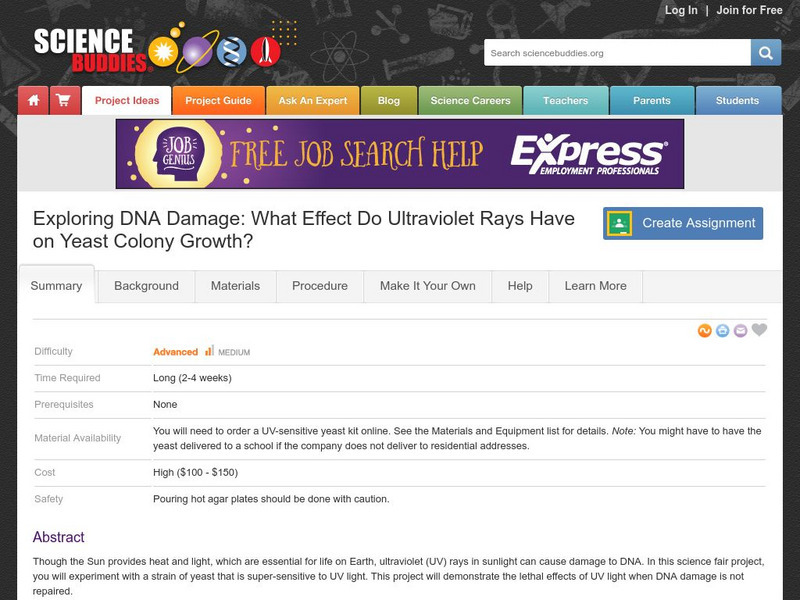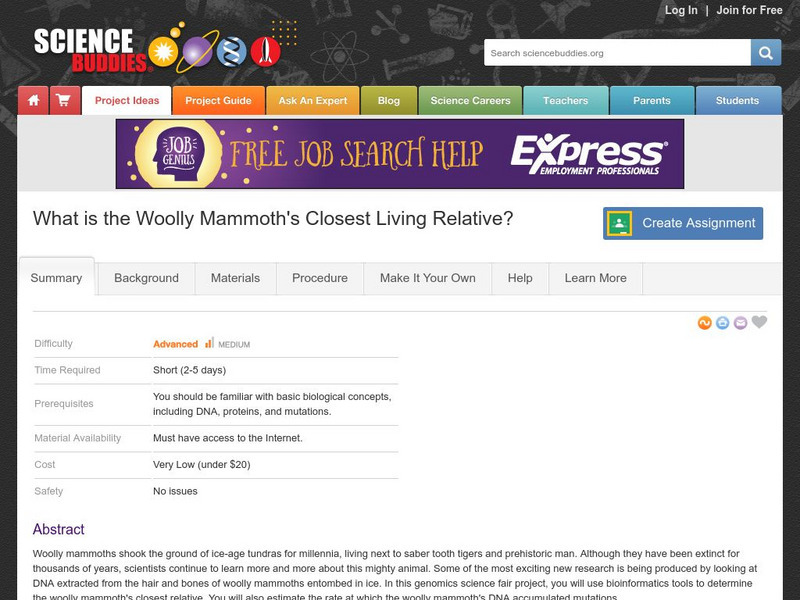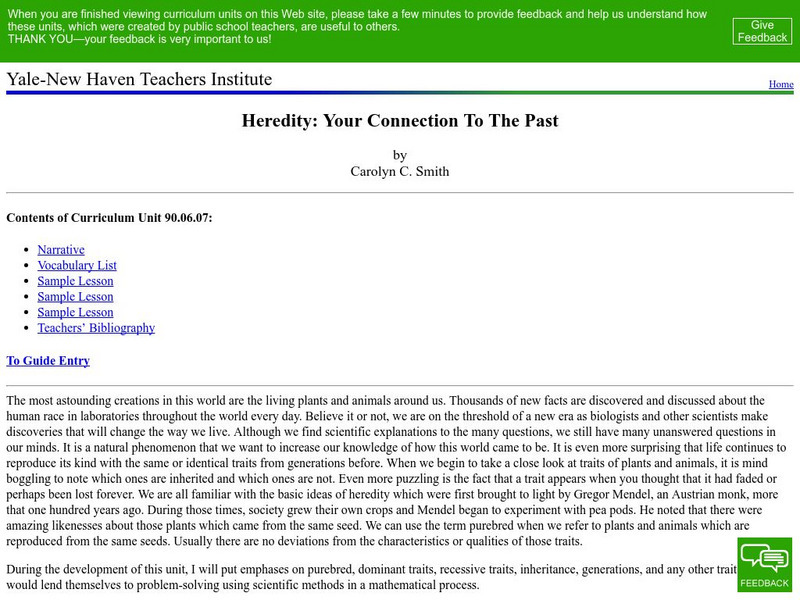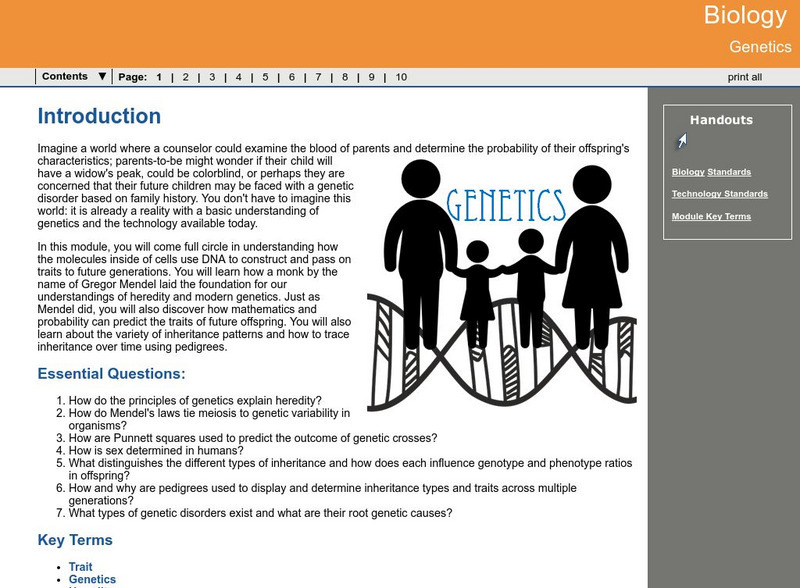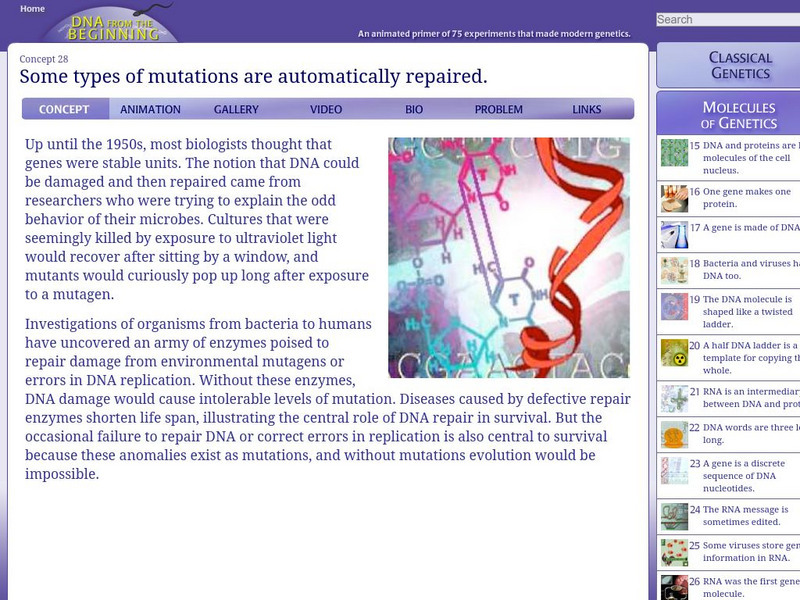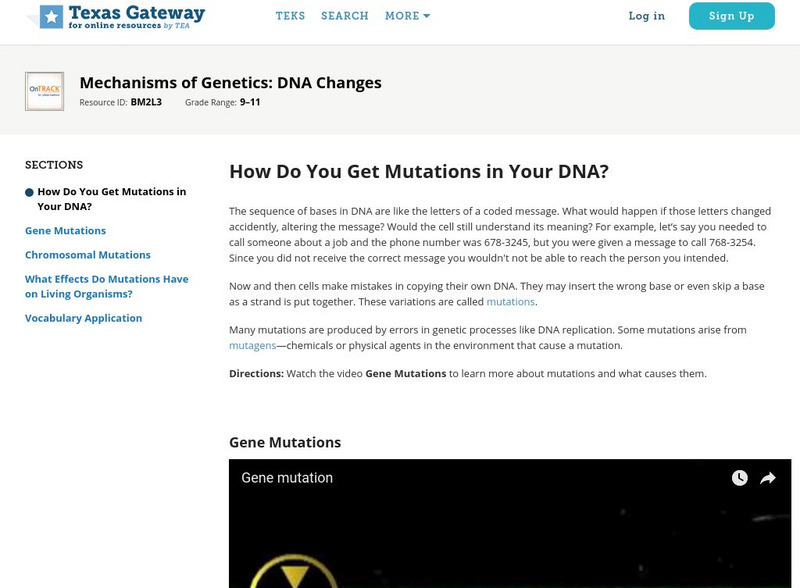PBS
Pbs Learning Media: Evolution on Double Time
In this excerpt from the PBS series "Evolution," award-winning science journalist Carl Zimmer describes how gene duplication may have been the key to the rapid evolution of the early stages of life on Earth.
PBS
Pbs Learning Media: Ruminants
Why do cows chew their cud? This video segment from Secret of Life: "Accidents of Creation" describes the physical adaptations that have made ruminants some of the most important, and certainly the most efficient, plant eaters on earth.
Science Buddies
Science Buddies: Project Ideas: Rad Radishes: Irradiation on Seed Germination
In this plant biology science fair project, students will investigate effects of irradiation on seed germination. The Science Buddies project ideas are set up consistently beginning with an abstract, objective, and introduction, followed...
Science Buddies
Science Buddies: Project Ideas: Dna Damage: Ultraviolet Rays and Yeast Colonies
In this biotechnology science fair project, investigate how DNA damage affects growth of yeast that are DNA-repair deficient. The Science Buddies project ideas are set up consistently beginning with an abstract, objective, and...
Science Buddies
Science Buddies: What Is the Woolly Mammoth's Closest Living Relative?
Although Woolly Mammoths have been extinct for thousands of years, scientists continue to learn more and more about this mighty animal. Some of the most exciting new research is being produced by looking at DNA extracted from the hair...
Yale University
Yale New Haven Teachers Institute: Heredity: Your Connection to the Past
An indepth introduction to genetics as a whole with sample lessons, vocabulary, and bibliography. From the Yale-New Haven Teachers Institute.
Estrella Mountain Community College
Estrella Mountian College: Introduction to Genetics
This site explains genetic beliefs before and after Mendel, and also includes a section on Mendel himself and his experiments, entitled, "The Monk and his Peas".
Encyclopedia of Earth
Encyclopedia of Earth: Microbiology: Mutation
Explains what genetic mutation is, results of mutation, types, how scientists use it in research and in medicine, what it looks like at the molecular level, chemicals that can cause mutation, and frequency of occurrence. (Published:...
Other
Blackwell Publishing: Evolution: Adaptive Explanation
These pages are part of a site called Evolution that accompany a textbook by the same name. Mark Ridley is the author. There is a large amount of information available about adaptations and their role in evolution.
CK-12 Foundation
Ck 12: Types of Mutation
[Free Registration/Login may be required to access all resource tools.] Everyone has mutations. Mutations are essential for evolution to occur. This tutorial defines mutations and explains the different types: somatic mutations, germline...
CK-12 Foundation
Ck 12: Causes of Mutation
[Free Registration/Login may be required to access all resource tools.] Learning activity defines mutagen, covers the causes of mutation, and gives examples of spontaneous mutations.
CK-12 Foundation
Ck 12: Mutation Effects
[Free Registration/Login may be required to access all resource tools.] Effects of mutations can be beneficial or they can be harmful. This tutorial describes the effects and provides examples of each.
Georgia Department of Education
Ga Virtual Learning: Biology: Genetics
Through informational text, interactive activities, practice problems, and video clips, students analyze how biological traits are passed on to successive generations.
Georgia Department of Education
Ga Virtual Learning: Biology: Evolution
Through informational text, online lab activities, virtual simulations, and video clips, students study the concepts of biological evolution.
CPALMS
Florida State University Cpalms: Florida Students: Cancer: Mutated Cells Gone Wild!
This tutorial reviews how uncontrolled cell growth caused by mutations in the cell cycle may cause cancer.
Texas Education Agency
Texas Gateway: Genetic Mutations
What causes a genetic mutation? What is the effect of these mutations? Learn about genetics mutations in this tutorial.
CK-12 Foundation
Ck 12: Biology: Mutation Effects
[Free Registration/Login may be required to access all resource tools.] Describes the effects of mutations.
Smithsonian Institution
Smithsonian Science Education Center: Natural Selection: Common Misconceptions
This video explores the misconceptions that students hold about natural selection. Go inside your student's heads to see what they are thinking during a lesson on evolution. Follow these suggestions for addressing these common...
Cold Spring Harbor Laboratory
Dna From the Beginning: Some Mutations Are Repaired
Experiments found that DNA could sometimes recover from damage. This article illustrates how the discovery was made. Article includes animations, pictures, video, biographical information, and quiz questions that are accessed by clicking...
Texas Education Agency
Texas Gateway: Mechanisms of Genetics: Dna Changes
Given illustrations or partial DNA sequences, students will identify changes in DNA and the significance of these changes.
Howard Hughes Medical Institute
Hhmi: Bio Interactive: The Molecular Evolution of Gene Birth and Death
An advanced instructional activity that describes the role of mutations in the birth and death of genes. It includes background information, examples, video clips, and animations.
WebMD
Web Md: Hutchinson Gilford Progeria
This site from WebMD Health provides great information on the Hutchinson Gilford Progeria Syndrome. It discusses synonyms, disorder subdivisions, and general discussion with resources. Links are provided throughout for additional...
University of Utah
University of Utah: Genetic Science Learning Center: Examples of Aneuploidy
Only a few types of aneuploidy are compatible with life. Use this drop-down menu to understand more about common genetic disorders resulting from monoploidy and polyploidy, such as Down Syndrome. Learn features of the disorder, see how...
University of Utah
University of Utah: Learning Center: learn.genetics: Making Sn Ps Make Sense
Find out how tiny variations in DNA can help scientists predict humans' response to drugs or to disease risk.




